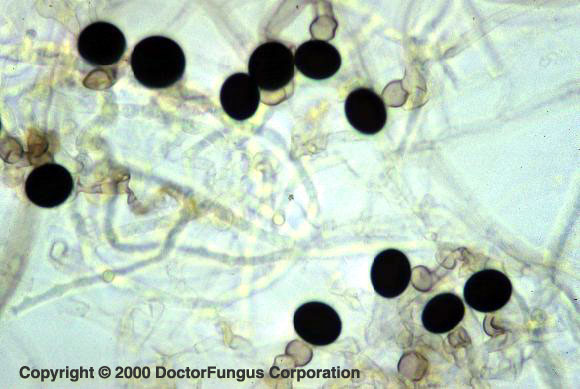(described by Zimmerman in 1902)
Taxonomic classification
Kingdom: Fungi
Phylum: Ascomycota
Order: Trichosphaeriales
Family: Trichosphaeriaceae
Genus: Khuskia (teleomorph)
Description and Natural Habitats
Nigrospora is a filamentous dematiaceous fungus widely distributed in soil, decaying plants, and seeds. It is a common laboratory contaminant. Although it has been isolated from a few clinical samples, its pathogenicity in man remains uncertain [531, 1295, 2144, 2202].
Species
Nigrospora sphaerica is the best-known species of the genus Nigrospora.
Synonyms
See the summary of synonyms and teleomorph-anamorph relations for Nigrospora spp.
Pathogenicity and Clinical Significance
Nigrospora has been isolated from cutaneous lesions of a leukemic patient and from a case with keratitis. However, its pathogenic role as a causative agent is not well-known [1847, 2218].
Macroscopic Features
Nigrospora grows rapidly and produces woolly colonies on potato dextrose agar at 25°C. The colonies mature within 4 days. Color of the colony is white initially and then becomes gray with black areas and turns to black eventually from both front and reverse. Sporulation may take more than 3 weeks for some isolates [531, 1295, 2144, 2202].
Microscopic Features
Septate hyaline hyphae, hyaline or slightly pigmented conidiophores, and conidia are visualized. The conidiogenous cells on the conidiophores are inflated, swollen, and ampulliform in shape. They bear a single conidium (14-20 µm in diameter) at their apex. Conidia are black, solitary, unicellular, slightly flattened horizontally, and have a thin equatorial germ slit [531, 1295, 2144, 2202].
Compare to
Humicola
Nigrospora is differentiated from Humicola by its very black conidia that originate from hyaline, inflated conidiophores.
Laboratory Precautions
No special precautions other than general laboratory precautions are required.
Susceptibility
No data are available.

